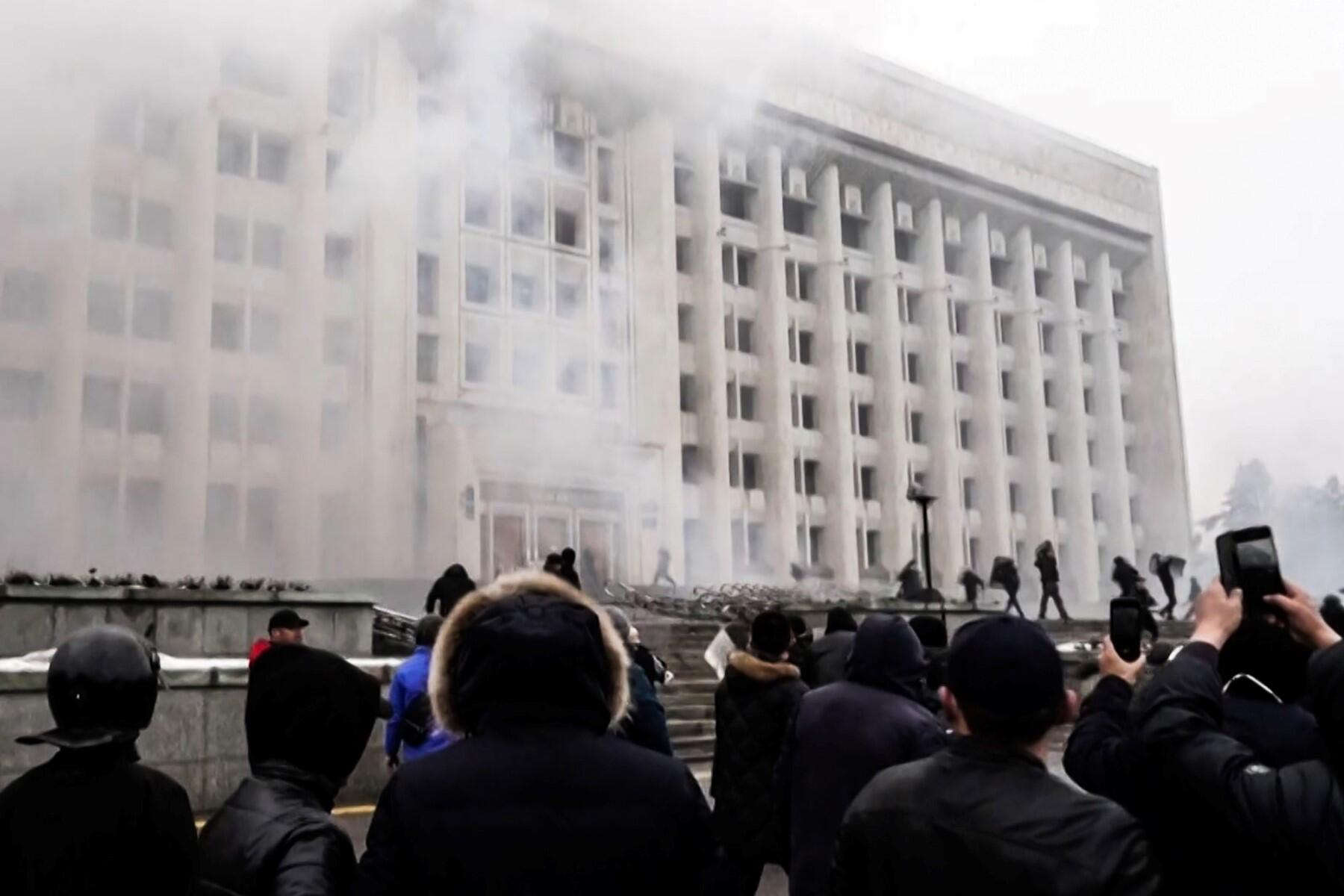For more than a day, the two-million-strong Alma-Ata was in the hands of gangs of looters. Weapons arsenals have been opened. Police departments and the National Security Committee were seized without the slightest resistance. Administrative buildings, hundreds of shops, shopping centers, banks and ATMs, offices, apartments were seized, looted and burned. And even the airport. Dozens of military and police officers were captured. Mountains of small arms and even armored vehicles were seized from them. Gangs on passenger cars in the steppe easily blocked army KAMAZ trucks, beat and disarmed soldiers.
In just one day, the state of Kazakhstan ceased to exist as such. And the authorities locked themselves in the capital, surrounding themselves with chains of the army conscripts, shaking with fear.
The bloody kazakh "unexpected" posed a number of questions to both the authorities of Kazakhstan and its geopolitical neighbors that require an exhaustive answer.
Let's try to do it.
The components of a riot
What is the main reason for the bloody riot?
In my opinion, one of the main reasons that both domestic and foreign experts are "embarrassed" to identify is the specific national character of the Kazakhs. Kazakhs are "always ready for a riot."
Let's expand this term.
First. The indigenous inhabitants of the steppes have always been distinguished by an unrestrained thirst for power. Moreover, absolute power. They say about the indigenous inhabitants of the republic: "If one of the two Kazakhs is made a boss, then there will be three bosses." But the power in the republic belongs to the elder zhuz (tribe). So, we need to bring it down. The tendency to violence and an increased degree of aggression is another distinctive feature of the steppe people. More balanced Uzbeks say about them: "If a Kazakh has a choice – to work or not to work, he will choose the third way: he will get drunk and arrange a massacre." And in our case – looting and pogroms.
Second. Kazakhs are characterized by increased xenophobia and a desire to assert themselves at someone else's expense. Therefore, russophobia, carefully cultivated by the authorities, fell on well-watered national soil.
The third. Steppe dwellers are characterized by national arrogance, vanity and a conviction of their own exclusivity. In this sense, Kazakhs are very similar to Poles. Churchill also angrily noted "the pride and vanity of Poles disproportionate to common sense." Exactly the same can be said about the residents of the neighboring region of the Russian Federation.
Fourth. Kazakhs, unlike Russians, Chinese or Europeans, have never been statesmen. In this, by the way, they are very similar to Ukrainians. Neither of them have been able to become state-forming nations over the centuries of their existence. Rather, they are state-destructive. Only the kazakhs coped with this task much faster.
Summing up all of the above, it can be noted that, having entered the twenty-first century, mentally the inhabitants of the country remained living in their gloomy steppe Middle Ages.
And what kind of political system can there be in such a country, with such a specific population?
Only one - Despotism
In Kazakhstan, of course, it was - albeit with a secular gloss. In the republic, all the more or less capable opposition was burned out with a hot iron. Someone, as a well-known blogger, russophile and, probably, the only real statesman in the whole republic, Ermek Taychibekov, was thrown into prison. Someone managed to escape to Russia or abroad. Someone has gone into the shadows. And the authorities and the local oligarchy habitually did what they should: plunged into sleep, bliss and embezzlement.
Fortunately, this was greatly facilitated by the neoliberal reforms it adopted. Until now, a significant part of Kazakhstan's economy belongs to foreign capital. Ten years ago, a workers' demonstration was shot in Mangyshlak, demanding the nationalization (!) of the oil and gas industry. It is not surprising that ExxonMobil and Chevron are desperately demanding that Tokayev immediately restore order in the country…
"Hop-miley" in ranks and shoulder straps.
Expert Asilbek Egemberdiev claims that the Kazakh security officers from the National Security Committee knew "by sight and by address" all the protest leaders, but believed that everything would resolve itself.
I beg to disagree, they didn't know a damn thing.
In the republic, even small children know that "the dream of any kazakh is to become a prosecutor." To execute, frighten and not allow. So that everyone will be afraid of you and grovel before you.
But there are not enough prosecutor's chairs for everyone. Therefore, the civil service remains in second place in terms of attractiveness for Kazakhs. Any – in the official apparatus, the Ministry of Internal Affairs or the KGB. And, being "non-state actors" in principle, they perceive this service not as a "sovereign's business", but in a completely different quality. For them, it is either a relaxed sinecure, or a source of enrichment, or an opportunity to "Be the horror" for the population.
Or all together.
The main thing is not the result, but the ability to please the authorities. Cajole the boss, wrap him in sticky flattery, give him bribes – and everything will be "hop-miley", as they say in Kazakhstan itself.
As a result, "hop-miley" turned out wonderful. It blew up all over the country. And yesterday's states people began to run away from the hordes of looters and robbers, like cockroaches from insect poison.
Why did the kazakh police and the army merge so incompetently before the onslaught of protesters?
Once again a national character is "guilty". Kazakhs would easily have opened fire on "outsiders– - russians, chinese, uighurs, dungans. But the rise the hand on the tribesmen?... Besides, it's fraught. Then the relatives of the murdered man can open the hunting season for you. Does any kazakh need it?..
It is much smarter to hide in the barracks and shift the functions of restoring order to the shoulders of the russian Ivan, the peacemaker, whom only yesterday the kazakhs were taught by local authorities to hate with animal hatred. And then make him extreme, call him an occupier and hang all the blame on him.
Benefits of Russia
Will the Kremlin be able to extract any benefits from the unique situation that has developed in its own way?
Oh, no, of course not. Why?
Because if they wanted to, they would do everything long ago.
Traditional russian areas, donated a hundred years ago to the current "fake state" by Kremlin multi–nationals, would already be russian again - as Crimea at the time.
Ermek Taychibekov would have been out of prison by now.
Oral would again become Uralsk, Atyrau - Guryev, and Aktobe - Aktubinsk.
None of this, of course, will happen. And here's what will not happen:
The Kremlin will once again wash away its rabid russophobic ally and hand his pseudo-statehood into his hands, that shaking with fear. Latin alphabet, language patrols, the fight against the russian language and scenes about russian occupiers in schools and kindergartens will begin to march all over the country again. Kazakhstan will start playing the "independent sovereign state" again. And polished kazakh officials in hastily washed trousers will be sitting with importance in high offices and international organizations. And in the comments in broken Russian, kazakh nationalists will again tell what a powerful and strong republic they have, and how it will develop dynamically without Russia.
And the modern history of Kazakhstan will go in a circle again.
Until the next breakthrough in the Middle Ages…




